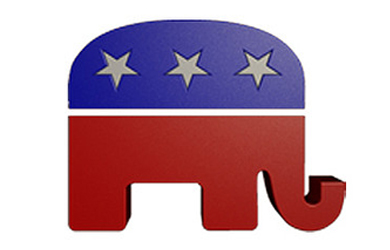Last year, we noted five ways in which Republican leaders were either ignoring or directly contradicting the recommendations put forth in the party’s post-election “autopsy report,” which called for a more diverse and modern GOP with a broader appeal. Today, on the first anniversary of the report’s release, it is clear that those who opposed the plan for a more inclusive party have prevailed, succeeding in moving the GOP even farther to the right.
Republican leaders seem to be accepting — albeit not openly — the pleas of right-wing pundits for the party to embrace ultraconservative views and veer away from outreach to young voters and people of color. These activists have called for the GOP to become a party focused on appealing exclusively to white voters with a mixture of Tea Party populism, Nativism and social conservatism.
This tension within the party has played out the most clearly in the debate over comprehensive immigration reform, in which reform advocates found themselves facing a wall of opposition from vocal activists. Many of these activists used the immigration debate to outline their vision for the party’s future, urging the party abandon immigration reform and instead work to increase its share of the white vote.
The extremists won the debate. The House Republican leadership has refused to even hold a vote on immigration reform and have approved only draconian bills that would curtail the rights of immigrants.
The GOP’s extreme right wing kept the party from taking up immigration reform by putting forward a political strategy argument backed by wink-and-nod racism.
Conservative luminary Phyllis Schlafly spent the year arguing that Latino voters are culturally resistant to Republican principles because they “don’t really understand our country.”
“The people the Republicans should reach out to are the white votes,” Schlafly said, arguing that Latinos are more likely to vote for Democrats over Republicans because they haven’t been sufficiently “Americanized.”
Rep. Michele Bachmann also warned that immigrants will usher in a far-left government that will jeopardize the future of America. Rep. Paul Broun similarly claimed that immigration reform is a plot to “destroy our country” by “keep[ing] Democrats in power for perpetuity.”
Pat Buchanan, true to form, was upfront about the strategy to stop immigration reform and expand the Republican share of the white vote. Buchanan wrote that just as the GOP used the Southern Strategy of racial polarization to win an overwhelming share of the Southern white vote, Republicans should adopt a new strategy “to increase the enthusiasm and turnout among [white voters] for the GOP” by “demand[ing] the sealing of America’s borders against any and all intruders.”
The Center for Immigration Studies, a leading voice on the anti-immigrant Right, also told Republicans no t to bother appealing to the Latino community and instead to frame Democrats as the “party of minorities.”
The GOP has also failed to make good on its promise to appeal to young and LGBT voters by moderating its hardline opposition to LGBT equality.
Last summer, RNC Chairman Reince Priebus reassured the Christian Broadcasting Network that the GOP is not becoming more tolerant and even lauded former governor and presidential candidate Mike Huckabee, a stringently anti-LGBT politician, as “a model for a lot of people in our party” on dealing with social issues.
Priebus was apparently under pressure from social conservatives like National Organization for Marriage founder Maggie Gallagher, who demanded that the party amplify its right-wing social agenda and avoid “adopting a suicidal political strategy.”
While Republican leaders say that the will accept openly gay Republican candidates for Congress, they have not budged on any items important to the LGBT community, blocking even the consideration of legislation to prevent job discrimination or inequality in the immigration system. Republican lawmakers have also pushed bills designed to roll back LGBT rights, such as the State Marriage Defense Act and the Marriage and Religious Freedom Act, and have challenged the Justice Department’s treatment of marriage equality laws.
It seems that the GOP has only committed itself to changing semantics and appearances, but is still committed to the same right-wing agenda that was soundly defeated in 2012.








